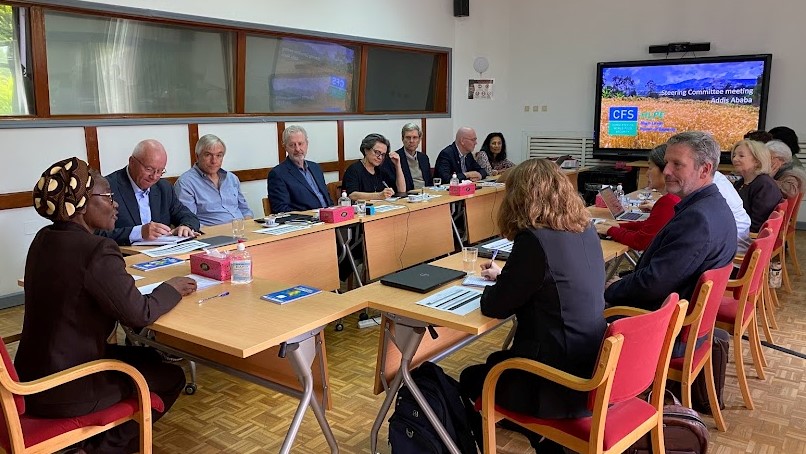
HLPE-FSN Steering Committee meeting in Addis Ababa
©HLPE-FSN/Silvia Meiattini
In March 2023, the HLPE-FSN Steering Committee met in Addis Ababa, Ethiopia, for one of its annual meetings, to work on the upcoming report “Reducing inequalities for food security and nutrition”, as well as discuss and agree on updated working procedures and plans, and advance in the call for experts on urban and peri-urban food systems.
The meeting was hosted by the International Livestock Research Institute (ILRI), thanks to Iain Wright, deputy director general for research and development and integrated sciences of ILRI and member of the HLPE-FSN Steering Committee.
The location of the meeting was remarkable, considering that Ethiopia had achieved notable progress over the past decade, from economic growth averaging 10% per annum (2007- 2017) to a reduction in extreme poverty and hunger rates by half (61 to 31%), according to WFP Ethiopia Country Brief, January 2023.

On the other hand, the country is experiencing a prolonged drought with four consecutive poor rainy seasons with a fifth forecasted, the first time in four decades. Furthermore, conflict in Northern Ethiopia has almost exhausted the coping mechanisms of millions of people and displaced hundreds of thousands from their homes, causing 4.5 million internally displaced persons across the country and the number of people undernourished to increase dramatically, up to 28.5 million people, according to FAOSTAT.
“The people most affected by shocks and crisis are poor and rural people, who face the greatest risks and require international support to finance adaptation – said Bernard Lehmann, Chairperson of the HLPE-FSN – the situation's gravity demands transformative and inclusive policies, based on technology, science and innovation, at local, national and international level”, he concluded after a fruitful discussion during the meeting with Namukolo Covic, ILRI Director General's Representative to Ethiopia.
Furthermore, when the HLPE-FSN Steering Committee meets in a place other than Rome, it is common practice to devote at least half a day to a so-called “public event”, with the objective of highlighting concrete aspects of policies implemented in the area of food security and nutrition. Therefore, in conjunction with the meeting, HLPE-FSN experts also took part in a public event, organized in collaboration with ILRI and CGIAR: “Ethiopia One CGIAR Launch: how science can contribute to food systems' transformation”.
The discussion during the event allowed participants to reflect on how CGIAR can leverage existing and planned activities to contribute to Ethiopia’s food systems' transformation efforts and how this relates to the African continental strategy, and can benefit the HLPE-FSN work on food security and nutrition.
The event featured remarks, presentations and live panels from:
Namukolo Covic, ILRI/CGIAR;
Bernard Lehmann, Chairperson of the HLPE-FSN;
Bahiigwa Godfrey, Director of Agriculture and Rural Development for the African Union, AU Commission;
Girma Amente, Minister of Agriculture;
Lia Tadesse, Minister of Health;
Mandefro Negussie, Chief Executive Officer, Ethiopian Agricultural Transformation Institute;
Olanike Adeyemo, Professor of Aquatic & Wildlife Disease Epidemiology & Toxicology, Pioneer Deputy Vice-Chancellor (Research, Innovation and Strategic Partnerships) at the University of Ibadan, Nigeria; member of the HLPE-FSN Steering Committee;
Patrick Webb, Professor of Nutrition at the Friedman School of Nutrition Science and Policy at Tufts University; member of the HLPE-FSN Steering Committee;
Alemayehu Seyoum, CGIAR;
Feto Esimo, Director General, EIAR;
Iain Wright, Deputy Director General, research and development integrated sciences, ILRI/CGIAR; member of the HLPE-FSN Steering Committee;
Regassa Fikiru, State Minister, Ministry of Agriculture.
"The CFS is the place to be when food security and nutrition are to be discussed, Lehmann said, opening the event.
Patrick Webb, Director for the Feed the Future Food Systems for Nutrition Innovation Lab at Tufts University and member of the HLPE-FSN Steering Committee, drew the attention to the consequences of inequalities and how "governments around the world want to know how to build equity into food systems".
Furthermore, debating on the main challenges and opportunities of the African continent, Olanike Adeyemo, professor at the University of Ibadan and member of the HLPE-FSN Steering Committee, highlighted that "food systems transformation in Africa requires a cultural shift to make sure all the evidence that is available translates into significant impacts on the ground".
Finally, she stressed the importance of data systems and digital technologies, which, if deployed properly, can play an enormous role in assisting policymakers with short, medium, and longer-term decision-making for improving food security and nutrition. "We need more data for food security and nutrition and better monitoring. Moreover, we need more regional knowledge sharing in Africa and greater regional collaboration", she concluded.